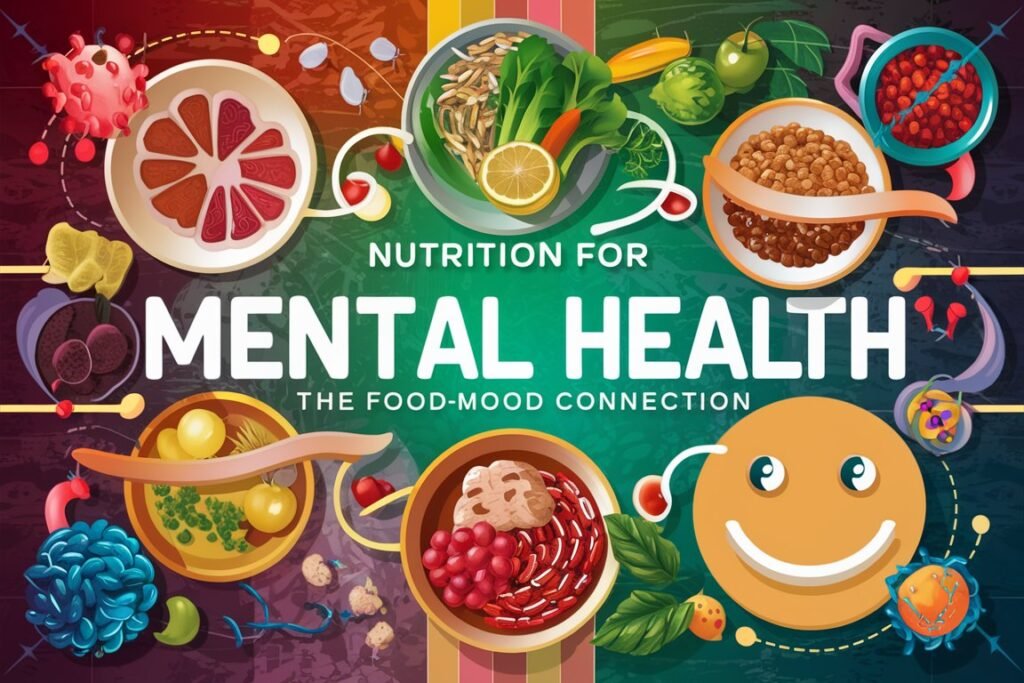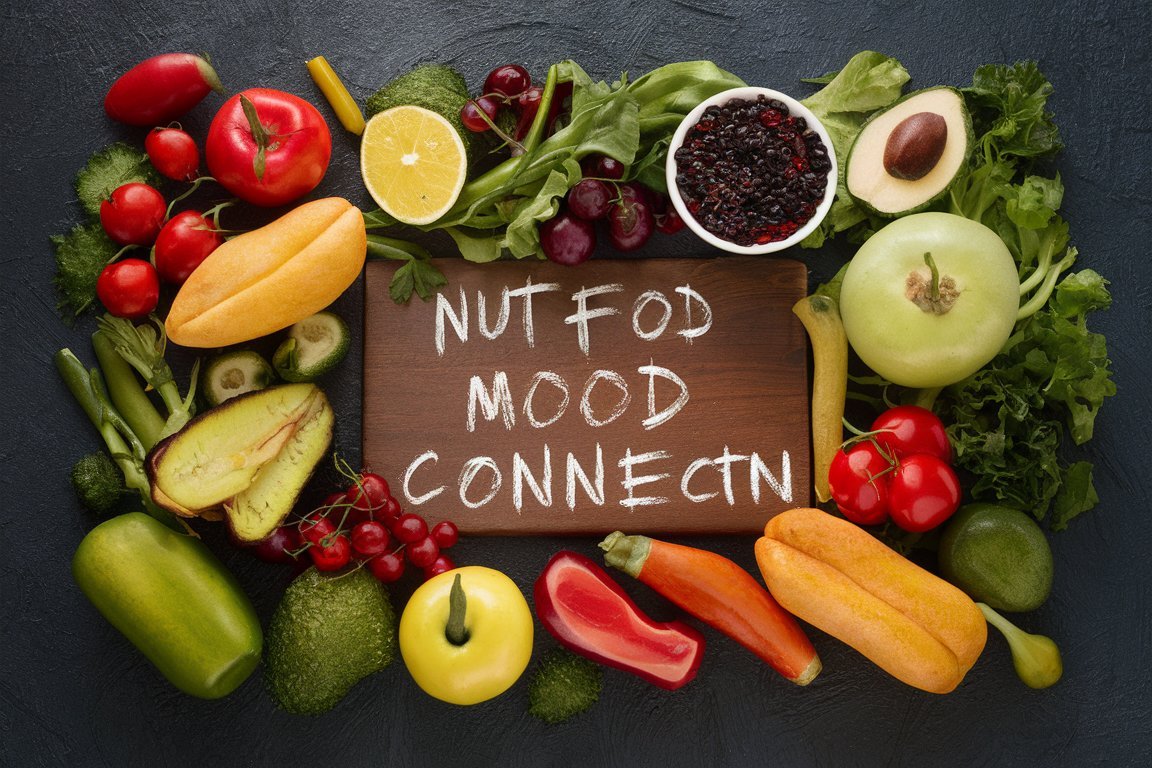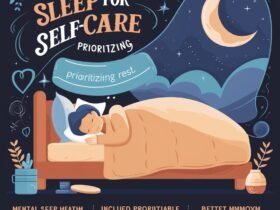Nutrition for Mental Health: The Food-Mood Connection
Hey there, my young and curious friends of 2024! It’s your favorite nutrition detective, Nita Sharda, here to take you on a fascinating journey into the world of food and mood. Now, I know what you might be thinking – “Food and mood? What do they have to do with each other?” But trust me, the connection between what we eat and how we feel is more powerful than you might think!
Today, we’re going to put on our detective hats and investigate how the foods we eat can impact our mental health and well-being. But before we dive in, let me make one thing clear – this is not about putting anyone on a strict diet or making them feel bad about what they eat. It’s simply about empowering you with the knowledge and tools to make food choices that support your mental health, now and in the future.
So, are you ready to uncover the secrets of the food-mood connection with me? Let’s go!
What is Mental Health?
First things first, let’s talk about what we mean by mental health. Mental health refers to our emotional, psychological, and social well-being. It’s about how we think, feel, and behave in different situations, and how we cope with the ups and downs of life.
Just like physical health, mental health is something that we all have, and it’s important to take care of it. When we have good mental health, we feel good about ourselves, we’re able to build strong relationships with others, and we’re better equipped to handle life’s challenges.
But sometimes, our mental health can suffer. We might feel sad, anxious, or stressed out, and these feelings can make it harder for us to enjoy life and do the things we love. That’s why it’s so important to take care of our mental health, just like we take care of our physical health.
The Link Between Food and Mood
So, how does food fit into the mental health picture? Well, it turns out that the foods we eat can have a big impact on how we feel, both in the short-term and the long-term.
Think about it – have you ever felt really energized and happy after eating a nutritious meal, or sluggish and grumpy after eating a lot of junk food? That’s because the nutrients (or lack thereof) in the foods we eat can affect the way our brains function and the way our bodies feel.
Some nutrients, like omega-3 fatty acids, B vitamins, and magnesium, have been shown to support brain health and improve mood. Other nutrients, like sugar and unhealthy fats, can have the opposite effect – they can make us feel tired, irritable, and even depressed.
But it’s not just about individual nutrients – the overall pattern of our diets can also impact our mental health. Diets that are high in processed foods, sugar, and unhealthy fats have been linked to an increased risk of depression and other mental health problems. On the other hand, diets that are rich in whole foods, like fruits, vegetables, whole grains, and lean proteins, have been shown to support mental health and well-being.

Mood-Boosting Foods to Include in Your Diet
Okay, so now that we know how important food is for mental health, let’s talk about some specific mood-boosting foods to include in your diet. Here are some of the best foods to eat for a happy, healthy brain:
1. Fatty Fish
Fatty fish, like salmon, sardines, and mackerel, are rich in omega-3 fatty acids, which are essential for brain health. Omega-3s help build and maintain the structure of our brain cells, and they also have anti-inflammatory properties that can help reduce the risk of depression and other mental health problems.
Try to include fatty fish in your diet at least twice a week. You can enjoy them grilled, baked, or even canned (just look for varieties that are low in mercury).
2. Berries
Berries, like strawberries, blueberries, and raspberries, are packed with antioxidants and other beneficial plant compounds that can support brain health. Some studies have even found that consuming berries regularly can help improve memory and cognitive function.
Plus, berries are a great source of fiber, which can help keep our digestive systems running smoothly (and as we’ll see later, gut health is closely linked to mental health).
Try adding a handful of berries to your breakfast cereal or yogurt, or enjoying them as a sweet and healthy snack.
3. Leafy Greens
Leafy greens, like spinach, kale, and collard greens, are rich in folate, a B vitamin that plays a key role in brain function. Low levels of folate have been linked to an increased risk of depression, so getting enough of this nutrient is important for mental health.
Leafy greens are also a great source of other brain-boosting nutrients, like vitamin C, vitamin K, and magnesium. Try adding a handful of leafy greens to your sandwiches, salads, or smoothies for a quick and easy nutrient boost.
4. Nuts and Seeds
Nuts and seeds, like almonds, walnuts, and pumpkin seeds, are rich in healthy fats, protein, and other nutrients that support brain health. For example, walnuts are a great source of omega-3 fatty acids, while pumpkin seeds are high in magnesium, a mineral that helps regulate mood.
Nuts and seeds also make a great snack option when you’re feeling hungry between meals. Just be sure to choose unsalted varieties and watch your portion sizes, as nuts and seeds can be high in calories.
5. Fermented Foods
Fermented foods, like yogurt, kefir, sauerkraut, and kimchi, are rich in beneficial bacteria called probiotics. These bacteria help keep our gut microbiome (the collection of microorganisms that live in our digestive tract) healthy and balanced.
And as it turns out, the health of our gut is closely linked to the health of our brain. In fact, some studies have found that consuming probiotics regularly can help reduce symptoms of anxiety and depression.
Try incorporating fermented foods into your diet a few times a week. You can enjoy them on their own or add them to salads, sandwiches, or grain bowls for a tangy, probiotic-rich twist.
Foods to Limit for Better Mental Health
Just as there are some foods that can support mental health, there are also some foods that can have the opposite effect. Here are a few types of foods to limit or avoid for better mental health:
1. Processed Foods
Processed foods, like packaged snacks, sugary cereals, and frozen dinners, are often high in unhealthy fats, added sugars, and artificial ingredients. These foods can cause rapid spikes and crashes in blood sugar levels, which can leave us feeling tired, irritable, and even depressed.
Plus, processed foods are often low in the nutrients our brains need to function at their best, like vitamins, minerals, and healthy fats.
Try to limit your intake of processed foods and choose whole, minimally processed foods whenever possible.
2. Refined Carbohydrates
Refined carbohydrates, like white bread, pasta, and sugary drinks, are another type of food that can negatively impact mental health. Like processed foods, refined carbs can cause rapid spikes and crashes in blood sugar levels, which can leave us feeling moody and fatigued.
Refined carbs are also often low in fiber and other important nutrients, which can further contribute to poor mental health.
Try to choose complex carbohydrates, like whole grains, fruits, and vegetables, over refined carbs whenever possible.
3. Alcohol
While a little bit of alcohol in moderation is usually okay for adults, drinking too much can be tough on our mental health. Alcohol is a depressant, which means it can lower our mood and make us feel more anxious or depressed.
Plus, alcohol can interfere with the quality of our sleep, which is essential for good mental health. Poor sleep has been linked to an increased risk of depression, anxiety, and other mental health problems.
If you do choose to drink alcohol, try to do so in moderation and be sure to stay hydrated by drinking plenty of water as well.
The Gut-Brain Connection
As we mentioned earlier, the health of our gut is closely linked to the health of our brain. In fact, some experts even refer to the gut as the “second brain” because of the complex network of neurons and neurotransmitters that exist in our digestive tract.
When our gut is healthy and balanced, it can help support mental health by producing important mood-regulating neurotransmitters like serotonin and dopamine. But when our gut is out of balance, it can contribute to mood disorders like depression and anxiety.












Leave a Reply